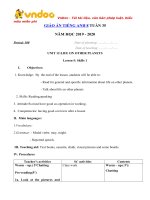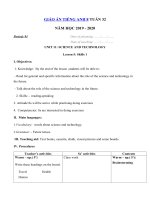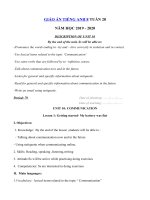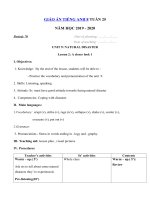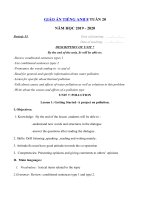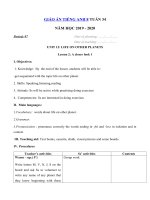Tải Giáo án tiếng Anh lớp 8 Tuần 25 sách mới - Giáo án điện tử môn tiếng Anh 8 theo tuần
Bạn đang xem bản rút gọn của tài liệu. Xem và tải ngay bản đầy đủ của tài liệu tại đây (165.57 KB, 18 trang )
<span class='text_page_counter'>(1)</span><div class='page_container' data-page=1>
<i><b>mẫu miễn phí</b></i>
<b>GIÁO ÁN TIẾNG ANH 8</b>
<b> TUẦN 25</b>
<b>NĂM HỌC 2019 - 2020</b>
<i><b>Period: </b><b> 70</b><b> Date of planning: ……/……/……</b></i>
<i> Date of teaching: ……/……/……</i>
<b>UNIT 9: NATURAL DISASTER</b>
<b>Lesson 2: A closer look 1</b>
<b>I. Objectives: </b>
<b>1. Knowledge: By the end of the lesson, students will be able to :</b>
- Practice the vocabulary and pronunciation of the unit 9.
<b>2. Skills: Listening, speaking </b>
3. Attitude: Ss must have good attitude towards facing natural disaster
<b>4. Competencies: Coping with disasters </b>
<b>II. Main languages: </b>
<i>1.Vocabulary: erupt (v), strike (v), rage (n/v), collapse (v), shake (v), scatter (v), </i>
evacuate (v), put out (v)
<i>2.Grammar:</i>
3. Pronunciation:- Stress in words ending in –logy and –graphy.
<b>III. Teaching aid: lesson plan , visual pictures</b>
<b>IV. Procedures</b>
<b>Teacher’s activities</b> <b>Ss’ activities</b> <b>Contents</b>
<b>Warm – up.( 5’)</b>
Ask sts to tell about some natural
disasters they’ve experienced.
Whole class <b>Warm – up.( 5’): </b>
</div>
<span class='text_page_counter'>(2)</span><div class='page_container' data-page=2>
<i><b>mẫu miễn phí</b></i>
<b>Pre-listening(10’)</b>
<b>Pre-teach vocab:</b>
<b>While-listening (20’)</b>
<b>1. Fill in each blank with a</b>
<b>suitable verb in the correct from</b>
<b>from the box below. Then listen,</b>
<b>check and repeat.</b>
<i>Write the first verb erupt on the </i>
board and elicits the past tense
<i>from Ss, writing erupted on the </i>
board. Do the same with all the
verbs. T may ask for a translation
of the verbs to check their
understanding. Leaving them on
the board as a reference. Play the
Whole class
Ss work independently to do the
activity. Then share their answers
with one or more partners.
<i>*Vocabulary:</i>
erupt(v)
strike(v)
rage(n/v) collapse(v)
shake(v) scatter(v)
evacuate(v)
put out (v)
bury (v)
rush into(v)
debris (n)
shelter (n)
<i><b>Key:</b></i>
</div>
<span class='text_page_counter'>(3)</span><div class='page_container' data-page=3>
<i><b>mẫu miễn phí</b></i>
recording for Ss to repeat the
sentences. With a stronger class, T
may wish to ask Ss to make some
more examples with the verbs in
the box.Finish all the exercises
<i><b>Audio script:</b></i>
1. Yesterday, a terrible storm
struck the rural area of Ha Giang
Province.
2. Villagers rushed into public
shelters as soon as the volcano
erupted.
3. Hundreds of buildings were
completely destroyed when the
earthquake shook the city.
4. The mudslide buried the whole
village while people were still
sleeping in their houses.
5. The forest fire raged for eight
hours and some animals were
badly injured or killed.
6. We managed to run out of the
house into the street before the
walls collapsed.
</div>
<span class='text_page_counter'>(4)</span><div class='page_container' data-page=4>
<i><b>mẫu miễn phí</b></i>
T may ask for translation of some
phrases to check their
understanding. Play the recording
for Ss to repeat the phrases.
<i><b>Audio script: 1. scatter debris</b></i>
2. take shelter 3. evacuate
the village
4. provide aid 5. Put out the
forest fire
<b>3. Now use the phrases in 2 in</b>
<b>the correct from to complete the</b>
<b>sentences.</b>
Have some Ss read out their
answers before checking with the
whole class. Confirm the correct
answers.
<b>Post-listening(7’)</b>
<b>Pronunciation</b>
<i><b>Stress in words ending in -logy</b></i>
<i><b>and -graphy</b></i>
<b>4. Listen and repeat these words.</b>
<b>Pay attention to the stressed</b>
<b>syllables.</b>
Play the recording and ask Ss to
listen and repeat the words,
playing attention to the stressed
First, Ss work independently.
Then, share their answers with
one or more partners.
Ss complete the sentences
individually, using the phrases in
2.
<i><b>Key: 1. b</b></i> 2. d 3. a
4. e 5.
C
<i><b>Key:</b></i>
</div>
<span class='text_page_counter'>(5)</span><div class='page_container' data-page=5>
<i><b>mẫu miễn phí</b></i>
syllables of each word. T may play
the recording as many times as
necessary. Explain the rule in the
<b>REMEMBER! Box and ask</b>
some Ss to give some words
<i>ending in -logy and -graphy.</i>
<b>5. Listen and mark the stress on</b>
<b>the correct syllable in the words</b>
<b>below. Pay attention to</b>
<i><b> -logy and -graphy.</b></i>
Ask Ss to work in pairs to practice
saying the words and mark the
stress on the correct syllable in
each word. Then T plays the
recording. Ss listen and check. T
may pause after each word and ask
them to repeat chorally. Correct
their pronunciation if necessary.
<b>6. Read the following sentences</b>
<b>and mark (‘) the stressed</b>
<b>syllable in the underlined words.</b>
<b>Then listen and repeat the</b>
<b>sentences.</b>
Ask Ss to work in pairs to mark
the stress in the words and practice
saying the sentences. Call some Ss
to give the answers and say the
sentences in front of the class.
<i><b>Words ending in -logy and </b></i>
<i><b>-graphy </b></i>
REMEMBER
<b>For the words ending in – logy </b>
<b>and – graphy, place the stress on</b>
<b>the third syllable from the end.</b>
soci’ology clima’tology
zo’ology as’trology
bibli’ography de’mography
Ss listen and repeat
Work in pairs
<i><b>Key:</b></i> 1. soci’ology
4.
clima’tology
2. zo’ology
5. as’trology
3.
</div>
<span class='text_page_counter'>(6)</span><div class='page_container' data-page=6>
<i><b>mẫu miễn phí</b></i>
Then ask Ss to listen while T plays
the recording. T may pause after
each sentences and ask them to
repeat chorally. Correct their
pronunciation. If there is not
enough time, after Ss mark the
stress, play the recording for them,
then check their answers and
repeat the sentences.
<b>Homework(3’):</b>
Prepare for unit 9 lesson 3
Ss work in pairs
<i><b>Key:</b></i>
1. We are
studying the
ge’ography of
Asia.
2. I had a
bi’ology lesson
this afternoon.
3. They share a
common interest
in pho’tography.
4. A bi’ography
is a book that
tells the story of
someone’s life,
written by
someone else.
5. Zo’ology is the
scientific study of
animals and their
behaviour
</div>
<span class='text_page_counter'>(7)</span><div class='page_container' data-page=7>
<i><b>mẫu miễn phí</b></i>
<b>UNIT 9: NATURAL DISASTER</b>
<b>Lesson 3: A closer look 2</b>
<b>I. Objectives: </b>
<b>1. Knowledge: By the end of the lesson ,students will be able to :</b>
- know how to use the grammar points correctly.
<b>2. Skills: Listening, speaking </b>
3. Attitude:Ss must have good attitude towards facing natural disaster
<b>4. Competencies: Coping with disasters </b>
<b>II. Main languages: </b>
<i>1.Vocabulary: words related to the topic</i>
<i>2.Grammar: Passive voice, past perfect tenses.</i>
<b> III. Teaching aid: lesson plan , visual pictures</b>
<b>IV. Procedures</b>
<b>Teacher’s activities</b> <b>Ss’ activities</b> <b>Contents</b>
<b>Warm – up.( 5’)</b>
- T asks Ss to tell something
they’ve known about natural
disasters.
<b>Presentation(10’)</b>
<b>Grammar</b>
<b>The passive voice: review</b>
Ask if Ss remember how to from
the passive voice. T may ask one
student to write the from on the
Whole class
Whole class
<b>Warm – up.( 5’): </b>
<b>Review</b>
</div>
<span class='text_page_counter'>(8)</span><div class='page_container' data-page=8>
<i><b>mẫu miễn phí</b></i>
board and have other Ss give
examples.
If they do not remember well, ask
<b>to read the REMEMBER! box.</b>
Draw Ss’ attention to how the
passive voice is formed by
analysing the rule. Then ask some
more able Ss to give some
examples to illustrate this.
<b>Practice (20’)</b>
<b>1. Read the conversation in</b>
<b>GETTING STARTED and</b>
<b>underline any sentence in the</b>
<b>passive voice that you can find.</b>
<b>Check your findings with a</b>
<b>partner.</b>
Ask Ss to read the conversation in
<b>GETTING STARTED again and</b>
underline all instances of the
passive voice that they can find.
Then, ask them to share their
findings with one or more partners
Pairwork
The passive voice is
formed with the verb to
be in the appropriate
tense and form, and the
past participle of the
main verb. Only verbs
which can take an object
can be used in the
passive.
Ex:
- Only a few minor
injuries were reported.
- Medical supplies, food
and rescue equipment
have also been sent.
<i><b>Key:</b></i>
Was anyone injured?
Only a few minor
injuries were reported.
It seems many houses
and public buildings
were destroyed or
flooded, and thousands
of people were left
homeless.
</div>
<span class='text_page_counter'>(9)</span><div class='page_container' data-page=9>
<i><b>mẫu miễn phí</b></i>
before checking with the whole
class.
<b>2. Complete the sentences using</b>
<b>the correct passive from of the</b>
<b>verbs in brackets.</b>
Have Ss work independently.
Then, ask them to share their
answers with one or more partners.
Ask some Ss to say their answers
aloud. Confirm the correct
answers.
<b>3. Rewrite the following</b>
<b>sentences using the corrects</b>
<b>passive voice.</b>
Invite two Ss to write the
sentences on the board while other
Ss write the sentences in their
notebooks. Ask some Ss to give
Ss work independently.
Then share their answers with one
or more partners.
who were trapped in
flooded homes.
Medical supplies, food
and rescue equipment
have also been sent.
They’ve been taken to a
self place where
temporary
accommodation will be
provided for them.
<i><b>Key: </b></i>
1. was scattered
2. Are built
3.
Were taken
4. will be predicted 5.
Will be delivered/ are
going to be delivered
<i><b>Key:</b></i>
1. Food and blankets
have been given out to
homeless people (by
volunteers)
</div>
<span class='text_page_counter'>(10)</span><div class='page_container' data-page=10>
<i><b>mẫu miễn phí</b></i>
comments on the sentences on the
board. Confirm the correct
sentences.
For a class that needs more
support, model the first sentence
for Ss. Have Ss write the next two
sentences and correct them
carefully. The rest can be done as
homework.
<b>The past perfect</b>
<b>4a Read part of the conversation</b>
<b>from GETTING STARTED.</b>
<b>Pay attention to the underlined</b>
<b>part.</b>
Ask Ss to read part of the
<b>conversation from GETTING</b>
<b>STARTED, paying attention to</b>
the underlined part. Then, refer to
the yellow box, explaining the
from of the part perfect tense and
going through the examples.
<b>b When do we use the past</b>
<b>perfect? Can you think of any</b>
<b>rules?</b>
Now ask Ss to think about the
Ss work independently. Then,
share their answers with one or
more partners.
<b>The past perfect</b>
* Forms:
<b>(+) Positive</b>
<i>Subject + had + past</i>
participle
<b>(-) Negative</b>
<i>Subject + had not/</i>
<i>hadn’t + past participle</i>
<b>(?) Questions:</b>
<i>Had + subject + past</i>
participle
3. Was the whole village
destroyed (by the
storm)?
</div>
<span class='text_page_counter'>(11)</span><div class='page_container' data-page=11>
<i><b>mẫu miễn phí</b></i>
rules for the past perfect tense.
First, try to elicit them from Ss.
Then go through the rules in the
boxes by analyzing the examples
given. Then ask Ss to give some
more examples of their own.
<b>5. Complete the sentences by</b>
<b>putting the verbs in brackets</b>
<b>into the simple past or past</b>
<b>perfect.</b>
<i>Had + subject + not +</i>
past participle
<i>Hadn’t + subject + past</i>
participle
<b>* Short answers to Yes/ No</b>
<b>questions:</b>
<i>(+) Yes, subject + had</i>
<i>(-) No, subject + hadn’t</i>
* The usage:
- The past perfect is used to
describe an action before a stated
time in the past.
Ex:
People had managed to leave the
flooded villages by 11 o’clock last
night.
- The past perfect is used to
describe an action that happened
before another action in the past.
Ex: People had already left the
flooded villages when the rescue
workers arrived.
First Ss work independently. Then
<i><b>Key:</b></i>
</div>
<span class='text_page_counter'>(12)</span><div class='page_container' data-page=12>
<i><b>mẫu miễn phí</b></i>
First, have Ss work independently.
Then, ask them to share their
answers with one or more partners.
Ask some Ss to say their answers
aloud. T give comments, and
makes any correction if available.
<b>6. Work in pairs. Ask and</b>
<b>answer the following questions</b>
<b>about you.</b>
First, ask Ss to prepare their
answers independently. Then
model the activity by asking a
student one of the given questions.
Ask Ss to work in pairs. T may go
around to provide help. Call some
pairs to practice in front of tha
class.
<b>Further practice(7’)</b>
<b>7. GAME</b>
<b>Work in two teams. Take turns</b>
<b>to give reasons why you were</b>
<b>pleases/ upset/ happy/ angry, etc.</b>
<b>Use the past perfect for the event</b>
<b>that had happened. Each correct</b>
<b>sentence gets one point. The</b>
<b>team with the most points wins.</b>
Model the game with the whole
class first. Divide the whole class
share their answers with one or
more partners.
Pairwork
Team work
</div>
<span class='text_page_counter'>(13)</span><div class='page_container' data-page=13>
<i><b>mẫu miễn phí</b></i>
into two teams (e.g. left side and
right side). Then allow members
from the two teams to take turns in
giving reasons why they were
pleased/ upset/ happy/ angry, ect.
Count the correct sentences to find
the winning team.
If time does not allow, T can
<b>choose either activity 6 or 7 for Ss</b>
to do.
<b>Homework(3’):</b>
Prepare for unit 9 lesson 4
<i><b>Period: </b><b> 72</b><b> Date of planning: ……/……/……</b></i>
<i> Date of teaching: ……/……/……</i>
<b>UNIT 9: NATURAL DISASTER</b>
<b>Lesson 4: Communication</b>
<b>I. Objectives: </b>
<b>1. Knowledge: By the end of the lesson ,students will :</b>
have some general knowledge of natural disasters.
<b>2. Skills: Reading, speaking ,writing</b>
3. Attitude:Ss must have good attitude towards facing natural disaster
<b>4. Competencies: Coping with disasters </b>
</div>
<span class='text_page_counter'>(14)</span><div class='page_container' data-page=14>
<i><b>mẫu miễn phí</b></i>
<i>1.Vocabulary: words related to the topic</i>
<i>2.Grammar: </i>
<b> III. Teaching aid: lesson plan , visual pictures</b>
<b>IV. Procedures</b>
<b>Teacher’s activities</b> <b>Ss’ activities</b> <b>Contents</b>
<b>Warm – up.( 5’)</b>
<b>YOUR VIEWS ON NATURAL </b>
<b>DISASTERS</b>
Before Ss open their books, ask
them to work in groups to discuss
<i>the question. Can we prevent</i>
<i>natural disasters with the help of</i>
<i>modern technology?</i>
<b>Pre-speaking(10’)</b>
<b>Pre-teach vocab:</b>
Help Ss understand the meanings
of the words in Extra vocabulary,
and any other words from the text
you think they won’t know, by
using examples, definitions or
even traditions.
Whole class
Whole class
<b>Warm – up.( 5’): </b>
<b>Discuss</b>
<i>*Vocabulary:</i>
</div>
<span class='text_page_counter'>(15)</span><div class='page_container' data-page=15>
<i><b>mẫu miễn phí</b></i>
<b>While-speaking(20’)</b>
<b>1. Listen to a radio programme</b>
<b>on 4 Teen News. Then fill in the</b>
<b>gaps with the words you hear.</b>
First, have Ss read the interview
and guess what the missing word
for each gap in the interview is.
Write the Ss’ ideas on the board.
Ask Ss to say which question each
<i>person is answering (Sarah and</i>
<i>Peter: the first question; Nubita</i>
<i>and Linh: the second question).</i>
Then play the recording. The first
time, ask Ss to close their books
and listen only. Then play the
recording again and allow Ss to fill
in the gaps as they listen. Ask Ss
to share their answers in pairs
before playing the recording a
final time to allow pairs to check
their answers. Refer Ss back to the
ideas on the board and decide
together if all of them are possible
options. If time is limited, T may
play only the sentences that
include the information Ss need
for their answers.
<i><b>Audio script:</b></i>
Welcome to ‘Nature and You.’
Today we have asked our listener
our listeners around the world to
call us to express their views on
these two questions: ‘Are there
more natural disasters now than
there were in the past?’’’ and ‘Are
we prepared to deal with natural
disasters?’
- Hi, I’m Sarah from Sydney,
Australia. I think there are more
natural disasters now than there
used to be. Whenever I what the
news on TV, I see places that are
<i>flooded or affected by drought.</i>
I’m certain this is the result of
climate change and global
<i>warming.</i>
- Hello, I’m Peter from London,
England. I don’t think that there
are more natural disasters now
than in the past. But more are
- in charge = in a
position of having
control or responsibility
for sb/ sth.
</div>
<span class='text_page_counter'>(16)</span><div class='page_container' data-page=16>
<i><b>mẫu miễn phí</b></i>
<b>2. Read the listeners’ views on</b>
<b>natural disasters again and</b>
<b>decide who you agree with and</b>
<b>who you disagree with.</b>
Ask Ss to decide whose opinions
they agree with and who they
disagree with.
<b>3. Answer the two questions.</b>
<b>Express your own views and</b>
<b>write them down below.</b>
being reported on the news in
shorter time periods. We’ve seen
them so often on the news that
we’ve become used to them.
- Hi, everyone, I’m Nubita from
Tokyo, Japan: I think recent
earthquakes and tsunamis just
show how unprepared we are to
deal with them. Despite all the
technology and knowledge
available to us nowadays, many
people become victims of natural
disasters.
- Good evening everyone, I’m
Linh from ha Noi, Viet Nam. I
don’t think we can prepare for
natural disasters as nobody knows
when or where they are going to
strike. It’s Nature’s way of
reminding us who is in charge and
that we should show more respect
to the natural environment.
Work individually
</div>
<span class='text_page_counter'>(17)</span><div class='page_container' data-page=17>
<i><b>mẫu miễn phí</b></i>
Have Ss make notes of their
answers to the two questions in the
interview. Remind Ss that it does
not matter what their answers are,
and that it is more important that
they justify their answers. T may
go around to provide help.
<b>Post-speaking(7’)</b>
<b>4. Work in pair. Now compare</b>
<b>your views with a partner. Do</b>
<b>you share the same views?</b>
Encourage each pair to negotiate
for the same views. If time allows,
have some Ss report on their
answers. Otherwise, move around
the class while Ss do this activity
and give assistance.
<b>Homework(3’):</b>
Prepare for unit 9 lesson 5
Pairwork
Ss work in pairs to share their
answers with a partner.
Mời bạn đọc thêm tài liệu Tiếng Anh lớp 8 tại đây:
Bài tập Tiếng Anh lớp 8 theo từng Unit: https: //vndoc.com/tieng-anh-lop-8
Bài tập Tiếng Anh lớp 8 nâng cao: https: //vndoc.com/tieng-anh-pho-thong-lop-8
</div>
<!--links-->
Tải Giáo án tiếng Anh lớp 10 Tuần 8 sách mới - Giáo án điện tử môn tiếng Anh 10 theo tuần
- 9
- 18
- 0

